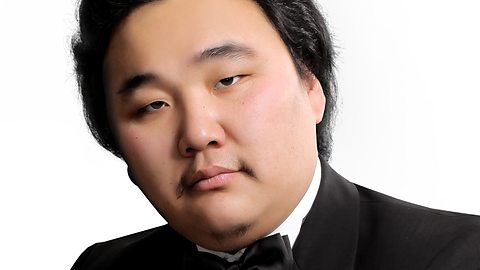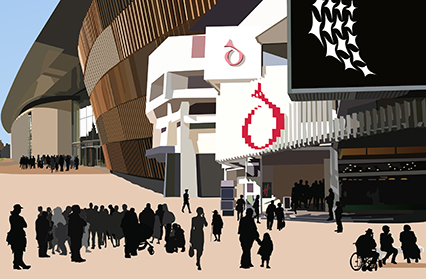Last night, June 17 2015, saw the penultimate of four BBC Cardiff Singer of the World Main Prize concerts at St. David’s Hall, from which a winner was chosen to go ahead to Sunday’s final. Nigel Jarrett attended the Main Prize Concert 3 of the Cardiff Singer of the World competition featuring five talented singers from around the globe.
The gladiators in this event will soon be approaching final wipe-out, their audience bedazzled by stellar presentation, bemused by commentary of variable helpfulness from experts, and surrounded by a vague sense of triumph and defeat that has nothing to do with music-making but much to do with the music business, when it’s not itself resembling an opera plot.
An expert from the competition’s early days – she shall be nameless – offered a view that had hitherto remained unspoken when, off-piste, she said that all the jury could do was decide, say, that contestant A was a better soprano than contestant B was a tenor. Her argument was complicated by a judging system in which the finalists had not necessarily won their heats (one or more of the runners-up in one heat perhaps having been ‘better’ than the winner of the next). Now, all the finalists will have been heat winners, with just a single overlooked also-ran receiving a ‘wild card’ ticket to join them. Maybe it’s better to be entertained than totally confused.
There was grand entertainment this time, the eventual winner convincing all but those with a tin ear that he had booked his place in the finals before the remaining contestants had sung. After Amartuvshin Enkhbat had given what amounted to a 29-year-old bass-baritone’s masterclass, you had to sympathise with J’nai Bridges and Blaise Malaba, who followed him after the interval with performances of, respectively, glittering spectacle and endearing warmth, not that the spectacle was hollow or the warmth incapable of rising. Moreover, Enkhbat has so far done his principle work at home in Mongolia, but with telling international forays. It’s amazing that no-one has yet spread the word about him. But, in all senses, Milan and New York can seem far away from Ulan Bator.
The pleasure began in a small way with Ilker Arcayürek, and by ‘small’ is meant a refreshing change from the kind of tenor who throws his voice at everything in a big way. Nothing wrong with either method in its place but the porcelain delicacy this singer brought to ‘Un’aura amorosa’, Ferrando’s apostrophising of loved ones from Mozart’s Cosi fan tutte, signalled the attention he also gave to his other items, including the Italian Tenor’s pastiche aria from Strauss’s Der Rosenkavalier, though the higher reaches in this last were gamefully, rather than easily, secured.
For sustained attention to detail in three fairly elaborate pieces, Anaïs Constans was outstanding, the plaintiveness of Pamina’s G minor ‘Ach, ich fühl’s, es ist verschwunden’ from Mozart’s Die Zauberflöte, contrasting with the title role’s ‘Je suis encore tout étourdie’, the heady song of praise to adventure, from Massenet’s Manon. No less impressive a characterisation was Gilda’s ‘Caro nome’ from Verdi’s Rigoletto. She successfully put herself to the severest test, crowning the Massenet item with brave and shapely coloratura singing.

But into all this swept Enkhbat, the winner, with more extended storytelling (in Russian) as the eponymous Prince Igor in Borodin’s opera bemoans his fate at defying ill omens. It got better. Drawing on huge vocal reserves and projecting with unerring accuracy and emotion he made of Gérard’s ‘Nemico della patria?’ from Giordano’s Andrea Chénier a compelling mini-drama of a man in a fix over love and loyalty, the Revolutionary who had once lived ‘in the realm of hatred and vengeance’. This was stirring stuff, not a bit forced or theatrical, and it ended in the same vein in Verdi opera, with Rigoletto’s ‘Cortigiani, vil razza dannata’ as the hunchback rails at his fellow courtiers over the abduction of his daughter.
There can’t be many other competitors with this singer’s muster of maturity, experience and conviction, albeit fostered in a remote place. He knew how to pace himself, too, taking an offstage break between each item before his spirited acts of roof-raising.
Enkhbat’s nearest close rival was probably the next up, J’nai Bridges, who did most to make the evening so variable with an insouciant version of ‘Die Nachtigall’ from Berg’s Seven Early Songs and the toccata ‘Ride on King Jesus’ from John Carter’s exuberant Cantata, its final bars showstopping in a peculiarly American way, which Bridges unselfconsciously embraced. But she was capable of more reflective delivery, the voice highly disciplined, especially in the title-role’s immolation song, ‘Ô ma lyre immortelle’ from Gounod’s Sapho. She was less convincing in ‘Deh! prottegimi, o Dio!’, Adalgisa’s aria of painful moral dilemma from Bellini’s Norma, so perhaps not one to open with; but her whole set oozed glamour and musicianly class, especially in the rafter-floated high notes.
Bringing up the rear after all this was the arguably unfortunate lot of Malaba, the competition’s first entrant from the Congo but currently studying in the Ukraine. The audience gave him an extra warm welcome, but it couldn’t deny that Leporello’s catalogue aria, ‘Madamina, il è questo’ from Mozart’s Don Giovanni, was a work-in-progress; the grave seriousness of Susanin’s renunciation aria from Glinka’s A Life for the Tsar (sung in Russian) his best effort; and lovelorn Ralph’s drunken ‘Quand la flamme de l’amour’ from Bizet’s La Jolie Fille de Perth a case of throwing everything, sometimes caution, to the wind. Perhaps more than most, he’ll have benefited from the Cardiff experience.
The orchestra, under its principal conductor, continued the sterling efforts of lighting the singers’ way, especially in places where the illumination reflected back on its own exertions.
Illustration by Dean Lewis
BBC Cardiff Singer of the World Main Prize Concert 3
Ilker Arcayürek (tenor), aged 30, Turkey.
Anaïs Constans (soprano), aged 26, France.
Amartuvshin Enkhbat (baritone), aged 29, Mongolia.
J’nai Bridges (mezzo), aged 28, USA.
Blaise Malaba (bass), aged 26, Democratic Republic of Congo.
BBC National Orchestra of Wales, conducted by Thomas Søndergård.\
Nigel Jarrett contributes to Wales Arts Review on music, books and other subjects. He is a winner of the Rhys Davies prize and the Templar Shorts award for short fiction. A former daily-newspaper journalist, he reviews for Jazz Journal and writes a column for it called Count Me In. His sixth book, a fictional memoir titled Notes From the Superhorse Stable, appeared this month from Saron Publishers; later this year, his fourth story collection, Five Go To Switzerland, will be published by Cockatrice Books, based in north Wales. In August he is Author of the Month for the National Library of Wales’s digital libraries project.



 Enjoyed this article? Support our writers directly by buying them a coffee and clicking this link.
Enjoyed this article? Support our writers directly by buying them a coffee and clicking this link.







